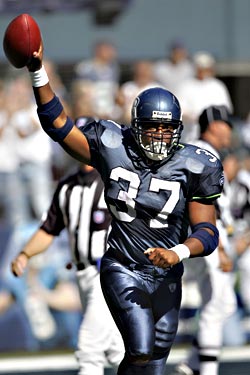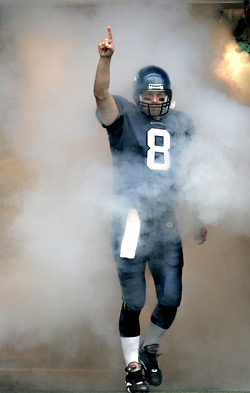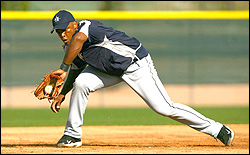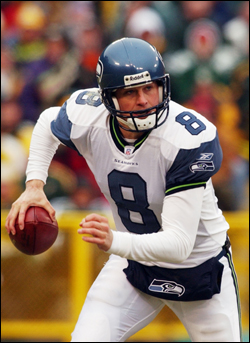THE BASEBALL GAMES ended just as the blame game was getting good. The Seattle Mariners, of course, went home Sunday to pick the corn chips from under the couch cushions and watch the New York Yankees (maybe) squirt each other with champagne. But the blame game started weeks before the fatal blow last Thursday, Sept. 25, in Boston. On that occasion the Red Sox, looking capable of ending the 85-year Curse of the Bambino and bringing the Hub its first World Series victory since 1918, officially did what all but the most optimistic of glass-half-fools knew was coming: The BoSox won, ending the Mariners pursuit of postseason baseball for a second consecutive year. The weekends set with the American League West champ Oakland Athletics, even given the lively sweep by Seattle, was like hosting your opponents victory party. Oakland would go home to meet Boston; the Yankees would get the Minnesota Twins; the Ms would have five months on the sofa, each of us a self-appointed shrink for a dysfunctional extended family our city has wanted to love.
For 3.3 million paying customers, the blame buck stops at the desk of General Manager Pat Gillick, who seemed, as the season and division lead disappeared, to be doing whatever he could to justify his retirement, which became official this week. The applicable baseball saying here has been, Sometimes the best trade you make is the trade you dont make. Even if this made sense (which, like so much about baseball, it doesnt), the contra positive might be: Most of the time, the best trade you make is the trade you do make. This year, Gillicks best was sending nothing much to the New York Mets for shortstop Rey Sanchez. That solidified an infield, shifting a suddenly active Carlos Guillen to third base, and Sanchez batted nearly .300. Then there were all those terrific didnt-make deals, such as the ones that didnt get rid of Jeff Cirillo, Freddy Garcia, Mike Cameronunproductive lugs (all probably moving on for 2004) who each make more dough than much of the Oakland lineup. Personnel matters unresolved by Gillick will have to be addressed as soon as a new GM is hired. Does Edgar Martinez limp through another year (and, if not, what designated hitter is going to put up Gar-like numbers)? Thats really the key to the Ms off-season, because most other player moves depend on putting together a lineup that actually hits and scores when it counts.
THATS PRECISELY WHY the Ms are through playing in 2003. Aside from left fielder Randy Winn and Edgar, every position player fell apart at crucial times, most of them after the All-Star break. Knowing this, its quite a stretch to blame team failure on the phantom players Gillick didnt sign. Perusing the Ms clubhouse after Sundays 9-3 finale, it didnt tax the imagination to guess which players were peeling off their Seattle flannels for the final time. Its easier, really, to name the players you keep. Pitchers certain to be back: Jamie Moyer (he got a standing ovation before the start of his 21st win Sunday); Julio Mateo (4-0, a 3.15 earned-run average, and solid gold in long relief); Rafael Soriano (3-0, 1.57, and he looks and often pitches like a young Bob Gibson); Ryan Franklin (a great gamer with soft run support). Starters Gil Meche and Joel Pineiro also ought to be around, and both would be Cy Young contenders had they been able to avoid giving up a big inning once per game. Reliever Shigetoshi Hasegawa is a maybe, and other arms the team has locked up will fight for remaining spots next spring.
The returning top-end position players are second baseman Bret Boone, right fielder Ichiro (even if they have to pay him the A-Rod-like money he deserves), and maybe first baseman John Olerud, Guillen, and Winn. Winn actually could be the everyday center fielder (as could Ichiro), with Chris Snelling, a minor-leaguer who has been injured a lot, in leftassuming Cameron moves on, as he indicates he will. Cammy would be worth keeping if the league established a non-hitting designated fielder position; short of that, let some other club give him $9 million to look at called third strikes.
THE SOUL OF a team reveals itself during the waning weeks of a season. The four American League playoff clubs comported themselves as deserving competitors, and any comparisons with Mariner stretch-run failures might seem cruel. So Ill cite a couple. One came a week ago: Super Tuesday, Sept. 23, when live contenders Seattle, Oakland, and Boston went to extra innings, the latter two prevailing while the local nine scored just one run and lost. The other comparison, here again, was Bostons Thursday, Sept. 25, game against Baltimore. Any kind of win gave the Sox the wild-card spot. But Boston wasnt satisfied with any kind of win, putting out 18 hitsas many as the Ms typically amassed in any four games down the stretchin winning 14-5.
Why did the Ms fail to satisfy so much of the playoff-crazed fan base this season? Blame the players who simply didnt want the postseason badly enough. Team execs now have five months to ponder whether another 3.3 million customers will pay to watch them not want it again next year.







